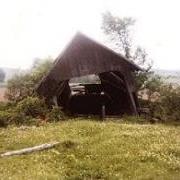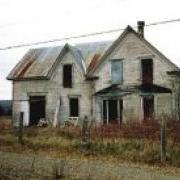 Vestiges of our past disappear all the time. Or they are altered beyond recognition. Countless historic landmarks have vanished from the Eastern Townships over the years. Particularly susceptible is our architectural heritage. From the humblest pioneer farmhouses to the most sprawling Victorian mansions; from early mills to industrial architecture; from clapboard churches to covered bridges to round barns to cemeteries: many have fallen victim to neglect, vandalism, or willful destruction.
Vestiges of our past disappear all the time. Or they are altered beyond recognition. Countless historic landmarks have vanished from the Eastern Townships over the years. Particularly susceptible is our architectural heritage. From the humblest pioneer farmhouses to the most sprawling Victorian mansions; from early mills to industrial architecture; from clapboard churches to covered bridges to round barns to cemeteries: many have fallen victim to neglect, vandalism, or willful destruction.
In the post-War period, the trend to replace the old with the new was particularly acute. In the 1950s, 1960s, and 1970s, much was lost. Today, much continues to be lost, not so much to demolition, but to an equally devastating culprit: over-renovation.
 Public awareness is particularly important when it comes to domestic architecture. It is nearly impossible for a community to preserve a privately-owned heritage home if the owner is determined to demolish it or obliterate its character through excessive renovation. If the will is not there, the building may be lost.
Public awareness is particularly important when it comes to domestic architecture. It is nearly impossible for a community to preserve a privately-owned heritage home if the owner is determined to demolish it or obliterate its character through excessive renovation. If the will is not there, the building may be lost.
This problem is heightened by the fact that local governments are usually reluctant to impose regulations that restrict homeowners' ability to do as they please with their own property.
So the best long-term solution remains education. The challenge is to convince people that what is old is not necessarily bad, but in many cases well worth preserving.
 Happily there is another trend helping to counter this movement: an increased emphasis on heritage tourism in the region. Local governments, organizations, and individuals are finally realizing the value of heritage as a means of bringing tourists into the region. Tourism associations are actively promoting the area's architectural and other heritage attractions. Many towns and villages have produced local walking tours. Some have passed protective legislation.
Happily there is another trend helping to counter this movement: an increased emphasis on heritage tourism in the region. Local governments, organizations, and individuals are finally realizing the value of heritage as a means of bringing tourists into the region. Tourism associations are actively promoting the area's architectural and other heritage attractions. Many towns and villages have produced local walking tours. Some have passed protective legislation.
Equally important is the growing number of local historical and preservation societies. These groups do much to promote awareness of heritage not just for its economic benefits but for its own sake. Heritage advocates realize that it is only through education that people will truly learn to value and appreciate heritage, and hence fight to ensure its preservation.